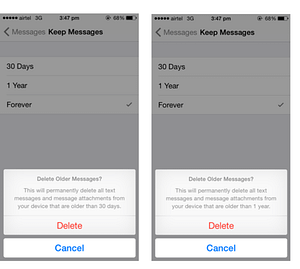
Dear Ms. Smartphone: I thought I had monkey brain because I was losing items stored on my phone like business cards, important addresses, and receipts. It turns out that these items were kept in my messaging app and they were auto deleted every 30 days. It was just by accident that I discovered what was happening and took control. This got me thinking about phones and human memory. I am back to using using my phone to collect and store data but do you have ideas of how to do that better? Tae, Millbrae
Dear Tae: Thanks for sharing this story and I am glad that what you identified as monkey brain was really the phone monkeying around with you. The message/delete function is fairly well hidden on the iPhone so the default settings might easily delete your messages. Information you had planned to commit to storage might disappear- as you observed, addresses, business cards, and other vitals.
FInD The Message Settings:
The Iphone fix is: Settings>Messages> and scroll far down the page to view Message History>Keep Messages. There you select whether messages will be deleted every 30 days, 1 year, or forever. On an Android device: search under Settings/Text Message Limit, and note the option when messages reach pre-set quantities. The Android system has a helpful “lock” message that protects messages from auto-deletion.
But to your question, we use more than messaging on our phones to store information and “virtually” extend our memories. For example, taking a picture of where we parked the car with the GPS turned on has become second nature. Or, typing reminders in notes, and then setting the phone’s alarm to ring as a backup. If there are newer options that try to extend phones and human memory, please send them in.
Extending Brain Power?
The underlying issue is how smartphones impact our capacity to retrieve and recall information. This recent article nicely summarizes the positions. There are a few schools of thought. One is that by offloading things, say low-importance things, we free up our brain to do more useful, high-importance things. Instead of say remembering the date for someone’s birthday, we can look at the calendar entries on our phone, or see the reminders on Facebook. But, a different view is that this reliance on our phone has a neurological component. In the spirit of “use it or lose it” prolonged use thins out the gray matter density in the brain and has negative effects on general cognitive functioning. Smartphones are relatively new, and so is the science to track this- albeit the thinning gray density is said to have been observed in the ABCD study tracking adolescent brains.
An observation I personally find compelling is made by authors Catherine Price (How To Break Up With Your Phone) and Larry Rosen/ Adam Gazaley (The Distracted Mind). On our phones we are continually multitasking. Our brains have to transfer memories from short-to-long term storage, and constant interruptions impede the process. That’s because we best remember things that we pay attention to. An interesting study of architectural features compared users who relied on cameras versus those who were cued to pay attention. It was the attention level, not pictures, that mattered. Most of the time when we use smartphones we seldom pay full attention to anything. Not even to something as important as driving.
Memory Connect:
Smartphones can be a useful place to put information, perhaps not that different from the notebooks or diaries that we used to jot things in. For some users they bring improvements since programs like Obsidian or Zotero can hold collections of things and link them together. But it takes time and concerted effort to find these software features and learn how to manage them. If, instead, we rapidly jump from app to app, we’ll risk being the monkey brain getting lost in the jungle. The positive side as I see it, is that you were mindful to what you were missing and stumbled on the phone’s settings. Even better, once you found the memory disconnect you kindly shared the tech tip.


Leave a Reply
You must be logged in to post a comment.